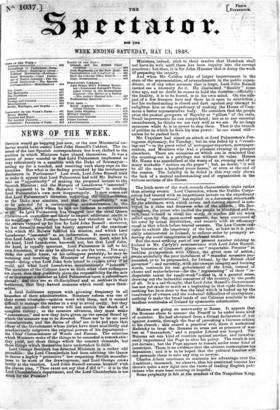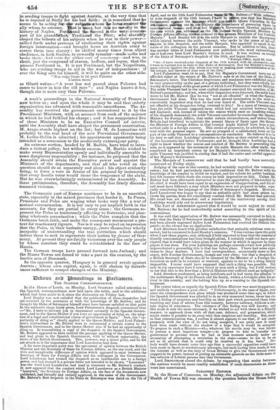Matters are going on untowardly at Rome. It appears that
the Romans chose to assume the Pontiff to be under some kind of coercion. He had abstained from a formal declaration of war against Austria, through the fear of provoking a German schism in his church ; this caused a practical evil, since it authorized Radetsky to treat the Romans in arms not as prisoners of war hut as marauders," and a popular Liberal was hanged. The Romans set one kind of coercion against another, and tumultu- ously importuned the Pope to alter his policy. The result is not yet certain; but the Pope appears to remain under some kind of constraint. There is no evidence that the citizens contemplate his deposition ; and it is to be hoped that the political fanatics will not persuade them to take any step so unwise. Charles Albert continues to maintain his advantage over the Austrians; insomuch, we observe, that his continued success has thrown quite a new light into the views of leading English poli- ticians who were least trusting or hopeful. Some perplexity is felt at the conduct of the Neapolitan King,
in sending troops to fight against Austria, at the very time that he is deposed in Sicily for his bad faith : iti is remarked that Le seems to be acting for the aubkett"whon, lier hetet:against' llbr ally whom he esteems. That islatiet but it no noue(ty in ae history of Naples. Ferdinand thhaicond in the Torn count part of his grandftedien, Ferdinand' the First; erbo alavislay obeyed the behests of his subjects when he was in their power— sallied forth under pretence of vindicating their rights againet foreign intervention—and brought home an Austrian army to coerce them into slavery : he shifted many times from abject obedience, in both Sicilies, to cowardly tyranny—made oaths and broke them—had tears for either curt of ceremony--and was, in short, just the compound of craven, buffoon, and rogue, that the present Ferdinand is. It is not Ferdinand, but the Neapolitans, who are sending troops to aid in the war of independence : if ever the King acts for himself, it will be quite on the other aide.
"Non volge Fenno in lui sentl Palermo L'antica razes,*
as Giusti writes—" A year has not passed since Palermo had cause to know in him the old race " : and Naples knows it too, though she is more easy than Palermo.



























 Previous page
Previous page